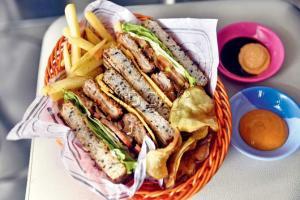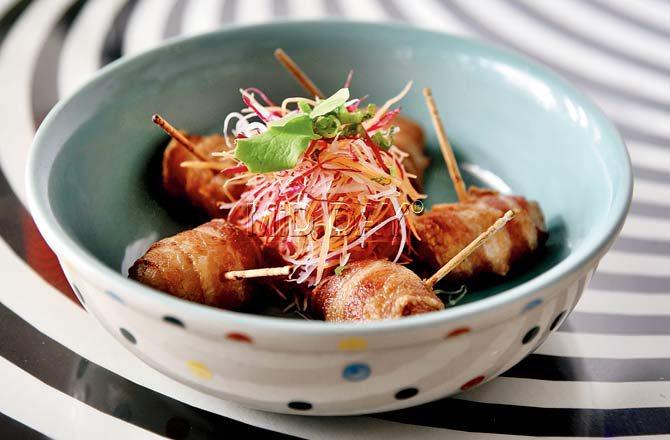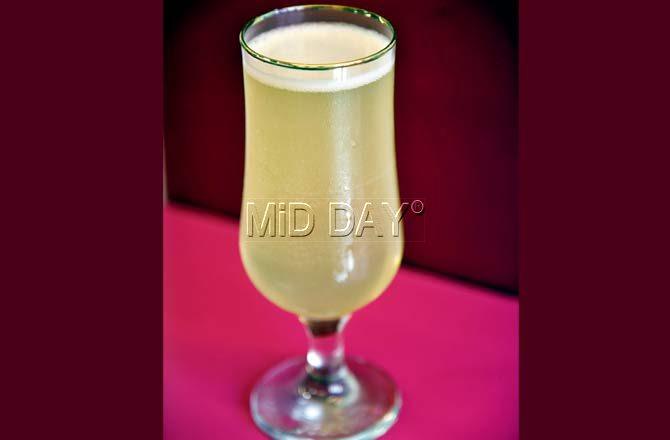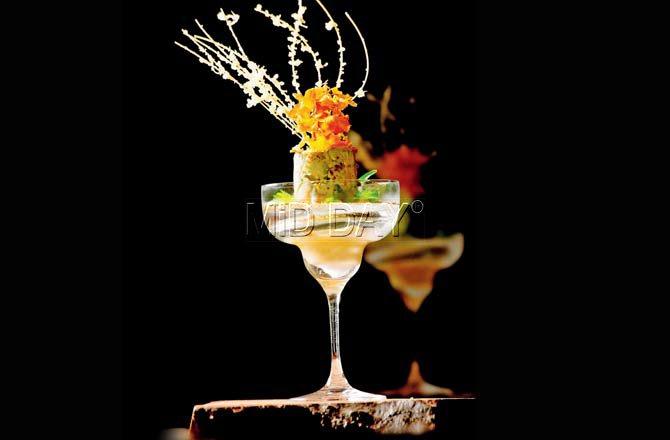Most of the Japanese restaurants sprouting in the city offer at least a dozen items. Why, then, are you stuck on the rice rolls and ramen bowls?

The katsu sandwich. Pics/Pradeep Dhivar
When you walk into Harajuku, a new Japanese eatery at Bandra's Chapel Road, it feels like you've entered Barbie's condo, except there's more to it than just candy coloured decor. The walls are dotted with frames of Japan's fashion forward youth, dressed in flamboyant outfits and caked in dramatic makeup.
ADVERTISEMENT
The Tokyo neighbourhood the joint is named after, has inspired scores of creative minds including photographer Shoichi Aoki, who launched a fashion magazine called FRUITS focused on individual styles found in Harajuku. Sadly, Aoki announced in February last year that the magazine would cease publication — effective immediately — because "there are no more cool kids to photograph."

Shrimp okonomiyaki
"But you can't say the same about food," insists co-owner Saleha Bawazir, whose husband, Aveek, lived in Melbourne, where there was a Harajuku eatery specialising in crepes. "He would eat it almost every day for breakfast before moving to Mumbai. The other Japanese connection is my cousin's wife, who is from Tokyo. Through her, we learnt that the area is as much about decadent street fare as it is about fashion," she adds.
More the merrier
If you have been following Instagram's food trends, you'll know that Harajuku hasn't fallen out of flavour just yet. "It's mind boggling to see the number of stalls offering choc-covered waffle shots, creamy crepes, pancakes and desserts. It was my husband's dream to introduce the same variety in Mumbai," she says.

Taiyaki, a fish-shaped cone made from a batter similar to waffles, topped with dollops of soft serve in matcha, vanilla, black sesame or chocolate flavours. Here, the batter is poured into the cast iron mould while a filling, usually Azuki or red bean paste or custard is piped on the other side
The idea of offering Japanese fare has caught the fancy of several restaurateurs in Mumbai. In fact, in the last one year, the city has seen many new openings including Keiba at Mahalaxmi, Izumi in Bandra and Lower Parel's Typhoon Shelter. Bawazir agrees that Japanese food is the next big thing. "What's interesting about the cuisine is the flavours they use to enhance seemingly simple food. The light dipping sauces, citrus, miso, wasabi, pickles, and soy sauce. It's a great balance of sweet, salty, sour and spice," says Bawazir.

Chicken tsukune with bacon
While ideating on the restaurant, the couple were aware that they were entering a market that has been witnessing immense growth. "But, it was mainly in the high cuisine. Nobody had thought of street food," she says. Much like its namesake, the space offers a wide range of sweet and savoury crepes, Dorayakis, palm-size treats comprising a sweet filling sandwiched between two round cakes — similar to American pancakes, among other things.
The only heavily Japanese sounding item that you'll need get used is shrimp okonomiyaki crepe, a savoury pancake (which looks like a cross between a dosa and frankie) that typically includes meat, vegetables and seafood. Here, it's served drizzled with tangy-sweet Japanese-style mayonnaise and okonomiyaki sauce. We also try a spoonful of just the mellow okonomiyaki (translates to one's liking) sauce, which will remind you of both a Worcestershire and barbecue sauce and is characterised by a sweet flavour and is as viscous as organic honey.

The apple elderflower drink at Harajuku
Serving new-gen fare
Two months ago, Vikram Khatri, executive chef at Hello Guppy, overhauled the menu to introduce a range of new items including caramelised popcorn with crispy bacon, beetroot rice cracker and tuna nachos pizza. This was an addition to the gourmet fare that the restaurant already offers. "Everybody knows about sushi and ramen. It was time to educate people that there's a lot more that comes from Japan," he says. He gives us the example of the Katsu sando, which gets most patrons curious because of the unusual ingredient — the bread.
"While you might think of Japan as a rice-eating nation, not many are aware of Japan's secret love for the loaf. It is usually white and pillowy," he says. At the restaurant, the chef uses chia seed multigrain sourdough bread with a white base. Interestingly, both Khatri and Bawazir concur that there's heavy Western influence on Japanese food. It's the Portuguese traders who introduced bread to Japan in the 16th century, as well as tempura and the deep-fried, breaded meat cutlets that the Japanese now call katsu.

Avocado tartare at Yuuka, St Regis
"A lot of pork is now being seen in Japanese cooking. We have borrowed the same formula, so we normally use bacon to wrap the Tsukune, Japanese chicken meatballs prepared yakitori-style where it is skewered and grilled. The sandwiches — four-egg omelette with taiyaki bread and the mushroom katsu with kinoko — come with French fries and sweet potato chips. And, indeed, you'll be struck by how the dishes look a lot like what you might have eaten at American diners.
The other form of Western influence is something you'll see on Harajuku's menu, where chocolate, custard cream, cream cheese, and nutella are prominent ingredients used as fillings in the pancake. "That is the way it is eaten in Japan. Luckily, in the city, chocolate is a big draw. It's almost a bait to lure patrons into experimenting with new pancakes," jokes Bawazir.

The Tokyo neighbourhood the joint is named after, has inspired scores of creative minds including photographer Shoichi Aoki, who launched a fashion magazine called FRUITS focused on individual styles found in Harajuku. Sadly, Aoki announced in February last year that the magazine would cease publication - effective immediately - because "there are no more cool kids to photograph." Pic/Getty Image
Having said that, there's enough to please the vegetarians in the Japanese diet. According to Khatri, the country has a rich tradition of cooking with vegetables, and a classic example of this would be the nabe or the hearty one-pot meals.
In keeping with this, Swapnil Doiphode, sous chef at Yuuka, The St Regis, introduced the avocado tartare, what he calls a progressive Japanese dish, where the creamy flesh of avocado is mixed with parsley, and then placed on a sheet of ice. When brought to the table, the server gently cracks the ice and pours dashi sauce made with corn and habanero, a hot variety of chili pepper. "It looks pretty and is healthy. So it's a win-win," he smiles.
Your next order
Shrimp okonomiyaki, Harajuku
Rs 300
Katsu sandwich, Hello Guppy
Rs 429
Taiyaki, Harajuku
Rs 280
Catch up on all the latest Mumbai news, crime news, current affairs, and also a complete guide on Mumbai from food to things to do and events across the city here. Also download the new mid-day Android and iOS apps to get latest updates
 Subscribe today by clicking the link and stay updated with the latest news!" Click here!
Subscribe today by clicking the link and stay updated with the latest news!" Click here!






